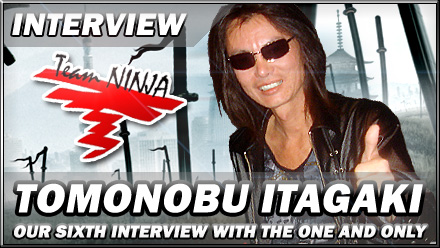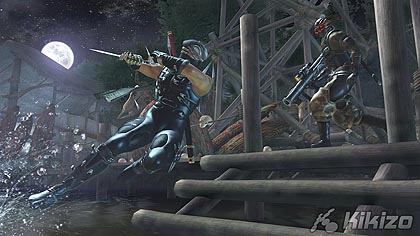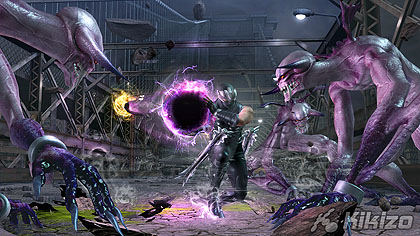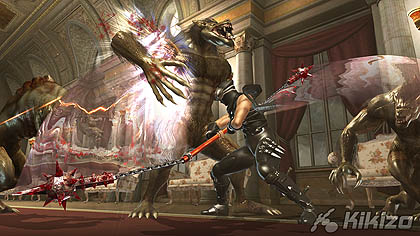Tomonobu Itagaki Interview June 2008
We catch up with the creator of Ninja Gaiden 2 to find out why this is the final in the series, why he disliked Sigma, and when we'll learn more about Code Cronus and DOA5.

Page: 1 2
By Adam Doree
In the short time since our fifth, huge interview with Mr Itagaki, the leader of Tecmo's Team Ninja studio has completed work on Ninja Gaiden 2 and you'll be able to start slicing off limbs starting tomorrow in America and this Friday in Europe.
We caught up with the legendary game designer to see how development ended up and how he truly feels about the final game - and of course, what he'll be up to next.
Enjoy this, our sixth exclusive interview with Itagaki, and look out for our full review of NG2 later this week, along with a chance to win one of ten copies of the game.
![]()
Kikizo: Can you tell us about working with Microsoft as the publisher for Ninja Gaiden 2 - did this change the way you have led the project in any way?
Itagaki: There are good things and bad things about working with Microsoft. In the past, working with Tecmo Inc, it's the same company, we're all friends, we're all closely tied which is good. But because we're so small and have limited resources, it's very hard to break out of a cycle and the way that we do things. So the reason we went to Microsoft this time around and asked them to work with us and publish the game is this is my last Ninja Gaiden. It's the definitive version. So I wanted to make sure that as many people as possible have the chance to play this around the world. One of the advantages of working with Microsoft is access to their resources, things like playtesters. They have a pool of over 1,000 people locally near their headquarters that they use to playtest. So getting feedback from all those people is a great way to improve the playability of the game. A lot of people have focused on the difficulty, how the difficulty changes etcetera. One thing we tried to do is make the game more accessible and easier to play - not necessarily easier in terms of absolute difficulty, but more fluid and easier to play, and a lot of that is because of what we've done with Microsoft testing.
Kikizo: It seems that traditionally, this is a stance you would have been very opposed to. In fact you on several occasions championed the difficulty of Ninja Gaiden 1 - gamers who couldn't complete it, that's you're problem! You're not strong enough! Was this 'softer' approach with NG2 something that followed some debate between you and Microsoft? Or did you just decide it make more sense this way?
Itagaki: Actually, it was earlier last year, I basically sat down and made a decision of my own volition saying I want to kind of change the paradigm of Ninja Gaiden and make it more accessible, make it a little more open and more approachable for all kinds of gamers. And it was after that that I began working with Microsoft to achieve that goal. So in terms of chronology it was an idea that I had first that we then worked with them to achieve.
Kikizo: With the broader audience in mind do you find it frustrating that far fewer people in local market of Japan will be playing it?
Itagaki: Yeah, there's nothing that can be done about that. Things like economic policies, the fact that the size of the population of children in Japan is dwindling, people are moving away from console gaming - there are a lot of factors involved, it's not just Xbox 360 doesn't do well in Japan because it's Xbox; there's a whole load of societal factors involved there. It's not as though the hardcore would make a big difference. This all goes back to decisions that politicians made like sixty years ago.
Kikizo: To me it doesn't seem like you need that vast additional QA, given how spectacularly bug-free and glitch-free your previous productions have been. Why do you even need all of that extra QA?
Itagaki: I think that their help with playtesting in what we call 'user experience testing' was huge. They have a user experience lab, where there's a room with a one-way mirror - we can see them and they can't see us - and there's also cameras that show their hands as they're playing, their face, and it shows what's happening on screen. So we can literally watch somebody as they're playing the game, see when they're frustrated, how they're feeling and how they're reacting, things like that. They speak about what they're experiencing. So from the facilities, to the engineers that run it, and the people that kind of analyse all that stuff, that's the kind of operation you get. So this is not so much just getting rid of bugs as it is taking care of the user experience.
Kikizo: That's interesting, that is more sophisticated that I had imagined goes in to many QA processes.
Itagaki: I think it's important to note, it's not 'because' it's Microsoft, it's not that we said it 'has to be' Microsoft. I basically set off and said to myself, I've been making games for fifteen years, and will be making many more games from now on. And Ninja Gaiden 2 was a chance for me to kind of reset everything, to go back to square one and say, what kind of games do I want to make, what is the market looking for, what kind of experiences do we need to make. So I kind of consider this the first product of my new way of seeing things, my new generation of game design, where I am really going to focus on those kinds of factors.
Page: 1 2








 Satoru Iwata Video Interview - the late Nintendo president spoke with Kikizo in 2004 as 'Nintendo Revolution' loomed.
Satoru Iwata Video Interview - the late Nintendo president spoke with Kikizo in 2004 as 'Nintendo Revolution' loomed. Kaz Hirai Video Interview - the first of Kikizo's interviews with the man who went on to become global head of Sony.
Kaz Hirai Video Interview - the first of Kikizo's interviews with the man who went on to become global head of Sony. Ed Fries Video Interview - one of Xbox's founders discusses an epic journey from Excel to Xbox.
Ed Fries Video Interview - one of Xbox's founders discusses an epic journey from Excel to Xbox. Yu Suzuki, the Kikizo Interview - we spend time with one of gaming's most revered creators.
Yu Suzuki, the Kikizo Interview - we spend time with one of gaming's most revered creators. Tetris - The Making of an Icon: Alexey Pajitnov and Henk Rogers reveal the fascinating story behind Tetris
Tetris - The Making of an Icon: Alexey Pajitnov and Henk Rogers reveal the fascinating story behind Tetris Rare founders, Chris and Tim Stamper - their only interview? Genuinely 'rare' sit down with founders of the legendary studio.
Rare founders, Chris and Tim Stamper - their only interview? Genuinely 'rare' sit down with founders of the legendary studio. The History of First-Person Shooters - a retrospective, from Maze War to Modern Warfare
The History of First-Person Shooters - a retrospective, from Maze War to Modern Warfare